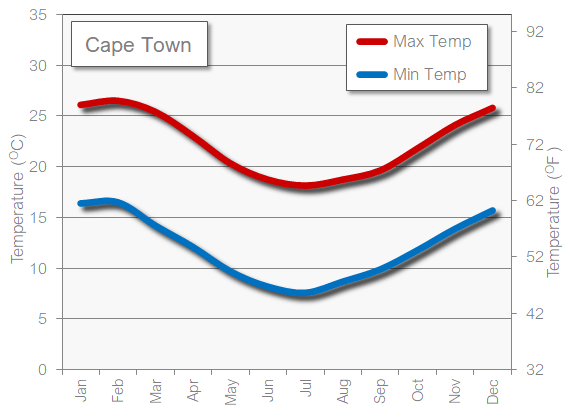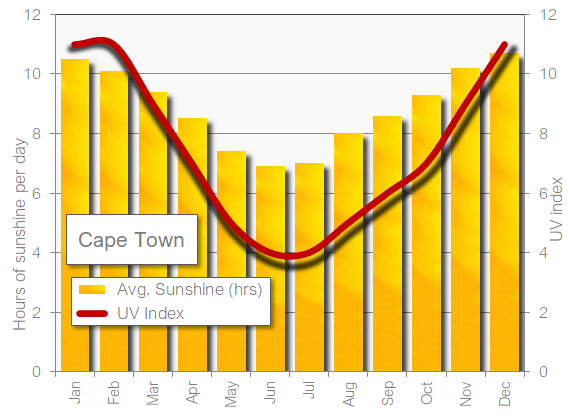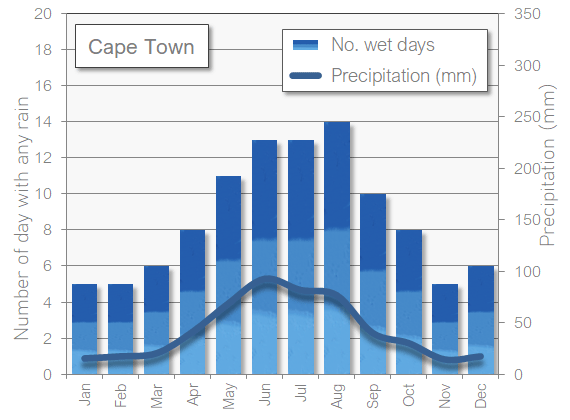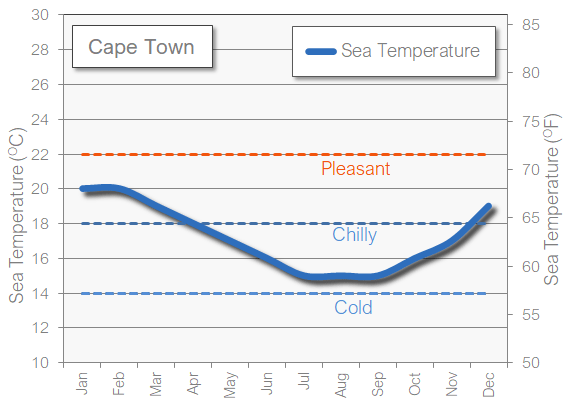Cape Town in February: the weather and best activities for your holiday
Cape Town, South Africa's Mother City, stands as one of the world's most spectacular urban destinations, where dramatic mountain landscapes meet pristine beaches and cosmopolitan culture. This vibrant metropolis offers visitors an intoxicating blend of natural beauty, rich history, and contemporary African charm. From the iconic Table Mountain to the historic Robben Island, Cape Town captivates travellers with its diverse attractions and warm hospitality that reflects its multicultural heritage.
February marks the height of summer in Cape Town, making it an excellent time to visit if you enjoy warm weather and outdoor activities. However, you should be prepared for peak tourist season, which means higher accommodation prices and busier attractions. The city buzzes with energy during this month, as both locals and international visitors flock to beaches and outdoor venues. Despite the crowds, February's stellar weather conditions make it one of the most rewarding times to experience Cape Town's many charms.
Overview of Cape Town's Climate in February
February represents the pinnacle of Cape Town's summer season, characterised by long, warm days with abundant sunshine and minimal rainfall. The city experiences a Mediterranean climate during this month, with dry conditions prevailing and the famous Cape Doctor wind occasionally making its presence felt. This south-easterly wind, whilst sometimes strong, serves as nature's air conditioner, preventing the heat from becoming oppressive and clearing any lingering cloud cover. The atmosphere tends to be relatively dry rather than humid, creating comfortable conditions for exploring the city's numerous outdoor attractions. February's weather patterns make it ideal for beach activities, mountain hikes, and al fresco dining experiences that Cape Town is renowned for.

During February, Cape Town experiences some of its warmest temperatures of the year, with daytime maximums typically reaching between 26°C and 28°C (79°F to 82°F). These pleasant temperatures create perfect conditions for enjoying the city's outdoor lifestyle without the extreme heat found in many other African destinations. Nighttime temperatures remain comfortable, rarely dropping below 16°C to 18°C (61°F to 64°F), allowing for enjoyable evening entertainment and outdoor dining experiences.
The weather is generally described as warm to hot during the day, but the proximity to the ocean and the occasional Cape Doctor wind prevent it from becoming unbearably hot. You'll find the temperatures particularly pleasant in coastal areas like Camps Bay and Clifton, where sea breezes provide natural cooling. Inland areas and the City Bowl can feel slightly warmer, especially during windless periods. The consistent warmth throughout February makes it unnecessary to plan your daily activities around temperature fluctuations, unlike the more variable conditions experienced during Cape Town's transitional seasons. (176 words)

February blesses Cape Town with extensive daylight hours, with sunrise occurring around 6:00 AM and sunset not until approximately 7:45 PM, providing nearly fourteen hours of daylight for your holiday activities. This abundance of natural light allows you to maximise your sightseeing opportunities and enjoy extended beach days without feeling rushed.
Cape Town typically experiences clear, sunny conditions throughout February, with an average of eight to ten hours of bright sunshine daily. Cloud cover is minimal during this month, with most days featuring brilliant blue skies that provide the perfect backdrop for photographing Table Mountain and the surrounding landscapes. When clouds do appear, they're often fleeting, quickly dispersed by the prevailing winds. The intense African sun during February means you'll need to take sun protection seriously, but it also guarantees excellent conditions for outdoor photography and ensures that solar-dependent activities like sundowner cruises showcase Cape Town at its most spectacular. (146 words)

February is one of Cape Town's driest months, with average rainfall typically measuring less than 20mm for the entire month. You can expect predominantly dry conditions, with rain occurring on perhaps only two or three days throughout February, and even then, usually as brief, light showers rather than prolonged downpours. The likelihood of experiencing a completely dry holiday is high, making February ideal for outdoor planning without weather-related concerns. Humidity levels remain pleasantly low, typically ranging between 60-70%, which contributes to the comfortable feel despite the warm temperatures. (87 words)

The Atlantic Ocean around Cape Town reaches its warmest temperatures in February, with water temperatures averaging between 19°C and 21°C (66°F to 70°F). Whilst these temperatures are swimmable, particularly for those accustomed to cooler waters, many visitors find the Atlantic quite refreshing rather than warm. The False Bay side, including beaches like Muizenberg and Fish Hoek, tends to be a degree or two warmer than the Atlantic seaboard beaches of Clifton and Camps Bay. For comfortable swimming, you might prefer the warmer afternoon waters when the sun has had time to heat the shallow areas, though many locals and regular visitors enjoy the invigorating quality of Cape Town's ocean temperatures year-round. (108 words)
Packing Tips and Recommendations for Cape Town
When packing for your February holiday in Cape Town, prioritise lightweight, breathable clothing suitable for warm summer weather. Essential items include shorts, t-shirts, sundresses, and comfortable walking shoes for daytime exploration, whilst a light jacket or cardigan is advisable for evening outings when temperatures drop or if the wind picks up. Don't forget to pack swimwear, a wide-brimmed hat, and high-factor sunscreen (SPF 30 or higher), as the African sun can be particularly intense during February.
Your February wardrobe should consist primarily of summer clothing—think cotton t-shirts and light trousers for daytime wear, with perhaps one pair of long trousers and a light jumper for air-conditioned restaurants or windier evenings. Beach attire is essential if you plan to enjoy Cape Town's beautiful coastline, and comfortable walking sandals will serve you well for both beach and city exploration. Consider bringing sunglasses with UV protection and perhaps a light rain jacket, though you're unlikely to need it.
When to Visit Cape Town?
The best months to visit Cape Town are typically from November through March, coinciding with the Southern Hemisphere's summer season. During these months, you'll experience warm, dry weather perfect for beach activities, hiking, and exploring the city's outdoor attractions. The summer season also brings numerous festivals and events, vibrant beach culture, and extended trading hours at markets and attractions. Wine estates are particularly beautiful during this period, with lush vineyards and perfect conditions for outdoor tastings.
Another excellent period to consider is September through November (spring) or March through May (autumn), which offer mild temperatures and fewer crowds whilst still maintaining good weather conditions. These shoulder seasons provide an ideal balance for visitors who prefer to avoid peak tourist periods but still want pleasant weather. During autumn, you'll witness beautiful colour changes in the Winelands, whilst spring brings spectacular wildflower displays and southern right whales visiting the nearby coast. These months often offer better value for accommodation and a more relaxed pace for exploring the city's cultural attractions.
When Not to Visit Cape Town?
The least favourable time to visit Cape Town is during June through August, the city's winter months. During this period, you'll encounter frequent rainfall, particularly in June and July, with cold fronts bringing persistent drizzle and occasionally severe storms. Temperatures drop significantly, with daytime highs averaging only 18°C (64°F) and nights becoming quite chilly. Many outdoor activities become less appealing or completely impractical, and rough seas often prevent boat trips and water sports.
The Best Activities and Sights of Cape Town in February
Table Mountain Cable Car and Hiking: February's clear skies and warm weather create ideal conditions for ascending Table Mountain. Take the revolving cable car for panoramic views, or challenge yourself with one of the hiking routes like Platteklip Gorge. The extended daylight hours allow for longer hikes, and you'll be rewarded with spectacular visibility stretching to the distant Hottentots Holland Mountains.
Beach Hopping Along the Atlantic Seaboard: Explore Cape Town's famous beaches, from the trendy Camps Bay with its palm-lined promenade and vibrant restaurant scene to the more exclusive Clifton beaches with their protected coves. February's warm weather makes these beaches perfect for sunbathing, picnicking, and enjoying sundowners at beachfront establishments.
Cape Point and Peninsula Tour: A full-day excursion around the Cape Peninsula is particularly rewarding in February's excellent weather. Drive the spectacular Chapman's Peak Drive, visit the penguin colony at Boulders Beach (less crowded in early morning), explore the Cape of Good Hope Nature Reserve, and stop at charming coastal towns like Simon's Town and Kalk Bay.
Kirstenbosch Botanical Gardens Summer Concerts: February falls within Kirstenbosch's famous summer sunset concert season. Enjoy world-class musical performances on Sunday evenings whilst picnicking on the lawns of one of the world's most beautiful botanical gardens. The gardens themselves are in full bloom during February, making daytime visits equally rewarding.
Wine Tasting in Stellenbosch and Franschhoek: The Cape Winelands are at their most beautiful in February, with vineyards heavy with ripening grapes just before harvest season. Enjoy wine tastings on scenic terraces, indulge in wine-paired lunches at award-winning restaurants, and explore historic Cape Dutch architecture in charming towns just 45 minutes from the city centre.
Robben Island Historical Tour: February's calm seas ensure reliable ferry services to Robben Island, where Nelson Mandela was imprisoned for 18 years. The half-day tour includes a bus tour of the island and a moving prison tour led by former political prisoners. Book well in advance as February's tourist numbers mean tickets sell out quickly.
Sunset Champagne Cruise from the V&A Waterfront: February's warm evenings and extended daylight make sunset cruises particularly special. Sail from the V&A Waterfront into Table Bay whilst enjoying champagne and canapés, with spectacular views of Table Mountain and the city skyline bathed in golden light. The calm February seas usually ensure a comfortable sailing experience.
District Six Museum and City Walking Tours: Whilst February's heat might seem challenging for walking tours, morning tours offer comfortable conditions for exploring Cape Town's rich history. Visit the District Six Museum to learn about apartheid's impact, explore the colourful Bo-Kaap neighbourhood, and discover the city's street art scene in Woodstock.
Muizenberg Beach and Surfing: February's consistent swell conditions and warmer False Bay waters make Muizenberg ideal for learning to surf or improving your skills. The beach's gentle waves and numerous surf schools cater to beginners, whilst the colourful Victorian beach huts provide an iconic photo opportunity.
February truly showcases Cape Town at its summer best, offering visitors the perfect combination of excellent weather, vibrant atmosphere, and optimal conditions for experiencing the city's diverse attractions. Whilst you'll share these experiences with many other tourists, the rewards of visiting during this peak season—guaranteed sunshine, warm temperatures, and access to all activities—make February an outstanding choice for your Cape Town holiday.